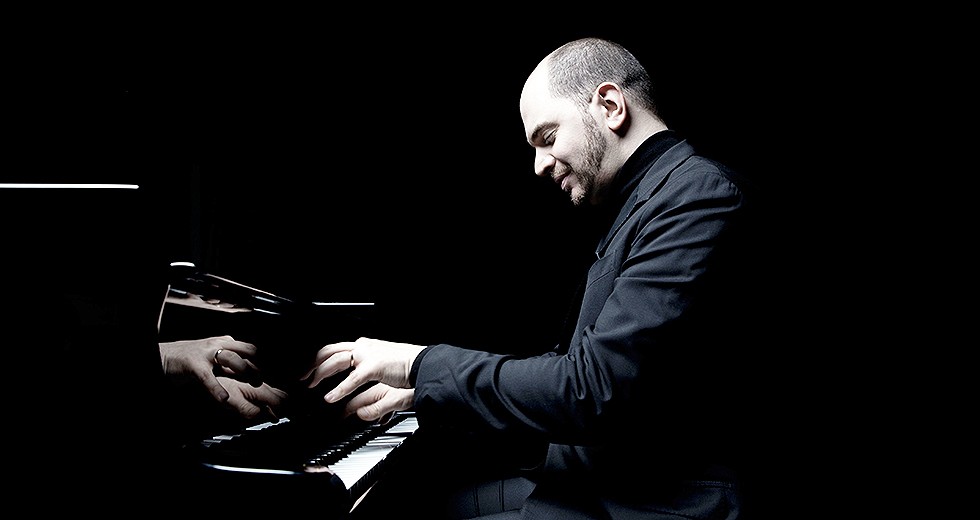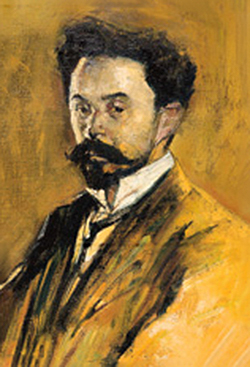
The celebrated Russian school of pianists is often associated with a muscular, flashy technique and an affinity for the big concertos of Prokofiev, Rachmaninov and Tchaikovsky. It’s a stereotype that Russian-born pianist Kirill Gerstein both embraces and rejects.
Now based in Berlin, Gerstein quickly admits that one way to deal with such expectations is to make a point of avoiding Russian works entirely, but he has never wanted to do that. “I like the Russian repertoire,” said the pianist, who will appear Dec. 3-5 with the Chicago Symphony Orchestra. “Secondly, I’m not so worried about being stereotyped because I try to counterbalance it with other things. I wouldn’t agree to just playing Rachmaninov, Prokofiev and Tchaikovsky, but at the same time, it would also seem somewhat strange to be saying, ‘No, I don’t want to be playing those [works].’”
Gerstein’s repertoire ranges from J.S. Bach and Ludwig van Beethoven to the Romantic era and extends right up to the present. He has commissioned an ever-growing group of works with a portion of the $300,000 prize he won with the Gilmore Artist Award in 2010. The two most recent such creations were Old Friend by up-and-coming Brooklyn composer Timo Andres, and Variations, Op. 93, “Homage to Haydn,” by veteran English composer Alexander Goehr. The pianist debuted the latter at the Santa Fe Chamber Music Festival in July.
Gerstein also is countering stereotypes in another way by taking on the music of Alexander Scriabin, a maverick Russian composer influenced by synesthesia and theosophy, developing his own brand of mysticism. During the Edinburgh Festival 2014, the pianist served as soloist for the first time in a rare performance of Scriabin’s Prometheus (The Poem of Fire), Op. 60 (1910), with composer-conductor Oliver Knussen and the Royal Scottish National Orchestra. The 20-minute symphonic poem, part of Scriabin’s third and most experimental period, calls for an augmented orchestra and chorus.
“It’s such a unique mixture of kind of the licentious, sexual, ecstatic and cult-like,” Gerstein said, “and it’s all expressed. It’s expressed in the piano writing. It’s expressed in orchestra — the orchestral colors. So when Oliver Knussen asked me if I would learn it for the concert at Edinburgh, I was without a second of hesitation.”
The CSO is performing the work as part of a two-year undertaking on the part of Music Director Riccardo Muti to present all five of Scriabin’s symphonies (Prometheus is often labeled as the composer’s Fifth Symphony) to mark the 100th anniversary of the composer’s death. “It’s a special treat to do it in Chicago for various reasons,” Gerstein said. “But one thing is that it is a special treat to do Prometheus at all, because it’s not a piece that gets to be done regularly. As you know, it requires a huge set of musical forces on the stage. It’s a grand happening.”
Introduced to these idiosyncratic works by famed Russian pianist Sviatoslav Richter, Muti has championed them since, undertaking a definitive set of recordings of them with the Philadelphia Orchestra in 1985-90. “No need to mince words here: This is the best Scriabin symphony cycle ever recorded, and arguably the finest thing that Muti did in Philadelphia,” wrote critic David Hurwitz of ClassicsToday.com. “To the orchestra’s characteristically opulent tone, Muti brings to this music a healthy and much needed dose of rhythmic discipline and dynamism.”
These concerts will provide the first opportunity for Gerstein to work with Muti. “I know that Mr. Muti has special affinity and affection for Scrabin,” he said. “Again, talk about disproving a stereotype. It’s not a Russian conductor. It’s Maestro Muti. I think that’s wonderful. His recordings of Scriabin are well-known and well-known to me. That’s another special treat to be doing that piece with him.”
Although Prometheus, as Gerstein was at pains to make clear, is not a concerto, rather a work where the pianist is an “important protagonist,” it nonetheless presents similar challenges to the soloist. “One of the tasks of the pianist is to be disciplined about the minute changes to my role as the pianist,” he said. “There are moments when one is very much a soloist, and then there are moments when one is very much a collaborative element with the conductor and with the orchestral instruments and sections. So that in this piece it is perhaps even more exaggerated than the traditional concerto. This kind of quicksilver switching of roles is something very typical of Scriabin and something that’s very typical of his music, that the moods change very, very quickly and very abruptly and go from, as he himself very poetically marks the scores, from lugubrious to ecstatic to earth-shattering to sensuously delicate within the space of a minute. So one of the challenges of his music generally is how extreme he is in the speed of changes and how extreme he is in the range of moods that are projected in his music.”
Bringing the most attention to Gerstein at the moment is another, much more familiar Russian work, Tchaikovsky’s Piano Concerto No. 1. A startling new revelation has raised troubling questions about the way this Romantic masterpiece, with its famous opening chords, has been performed and understood for more than a century. Recent research suggests that the familiar version of this piece is not the one that the composer actually wrote. “It is not the same and also neither authorized nor confirmed nor done by Tchaikovsky, and that is interestingly enough the version that until recently has prevailed,” Gerstein said.
 Earlier this year, Gerstein became the first pianist to record a newly published urtext or original edition of the composer’s 1879 version. The release, with conductor James Gaffigan and the Deutsches Symphonie-Orchester Berlin, won an ECHO Klassik Award — Germany’s top such classical honor. Gerstein also played it with the London Philharmonic earlier this year and has future performances scheduled with the Iceland Symphony and with the Czech Philharmonic as part of a European tour.
Earlier this year, Gerstein became the first pianist to record a newly published urtext or original edition of the composer’s 1879 version. The release, with conductor James Gaffigan and the Deutsches Symphonie-Orchester Berlin, won an ECHO Klassik Award — Germany’s top such classical honor. Gerstein also played it with the London Philharmonic earlier this year and has future performances scheduled with the Iceland Symphony and with the Czech Philharmonic as part of a European tour.
While doing some research of his own for a 2013 piece published in the New York Review of Books about a possible wrong note in the concerto, Gerstein stumbled onto the discrepancies surrounding the work. He contacted Polina Vaydman, senior researcher at the Tchaikovsky State Museum in Klin, who happened to be working on the new edition of the concerto. She agreed to share some of her findings with Gerstein, and the museum subsequently allowed him to make the recording in tandem with the publication of the work’s new edition. Earlier this year, Gerstein wrote a second piece, also for the New York Review of Books, that outlined the discoveries and their significance.
After completing the concerto in 1875, Tchaikovsky made a few alterations to the piano part, and this second version was published in 1879. (During his last visit with the CSO, Gerstein visited its archives and asked to see the orchestra’s old editions of the concerto. Among them is the original 1879 version, which the CSO’s first music director, Theodore Thomas, used for performances of the work during his 1891-1905 tenure.)
Then in 1894, a third edition of the concerto was published — a flashier version that made it “louder and more bombastic,” with modified tempos and articulations and an entire section cut from the third movement. Though no conclusive connection exists, evidence points to Alexander Siloti, a student of Tchaikovsky, as the likely instigator of this edition. “What didn’t help is that Mr. Siloti had a good talent for self-promotion, so he said that, absolutely, Tchaikovsky knew about and had said this was the way to do it,” Gerstein said. “But it turns out, when the facts are investigated, that the neither the dates nor any sources confirm that Tchaikovsky knew about this or authorized this.” Despite the apparent divergence from the composer’s wishes, this version gradually became standard.
In preparing this new edition of the concerto, researchers at the Tchaikovsky Museum went back to the composer’s autograph manuscripts and early printed scores. Most important, they looked at the composer’s own conducting score, with its hand-written performance markings, which he used up to and including his last performance on Oct. 28, 1893.
“The changes — some are smaller, some are bigger — but all contribute to a different portrait of the concerto,” Gerstein said. “It’s more lyrical, more musical, more balanced — balanced between the piano and the orchestra and balanced in musical architecture because of this restored bit in the third movement that traditionally has not been heard in performances. So I think people, musicians and non-professional listeners alike, have been very positive in their response. I feel very strongly that we should be playing what Tchaikovsky wrote, because I think in this case, it is better.”
But are pianists and orchestras going to be willing to break from established tradition and adopt this new old version of a concerto that we thought we knew so well?
“This is, of course, to be seen but I think a trend has started a bit with our recording and with the release of the publication of the new edition,” Gerstein said. “So I hope and wish that Tchaikovsky’s own version will start appearing more often, and I know that already a number of conductors have said that they would like to do the original version with me. Some pianists have contacted me and said they would be interested in performing this version as well. And most people I know say they prefer the original version. So I really think it is a matter of us continuing to publicize the existence of this issue and possibility. I can’t predict whether this is the version that then will prevail, but I think this is a version that will appear more often in concert halls as people become more aware of it.”
Kyle MacMillan, former classical music critic of the Denver Post, is a Chicago-based arts writer.
TOP: Kirill Gerstein calls Scriabin’s Prometheus “a unique mixture of kind of the licentious, sexual, ecstatic and cult-like.” | Photo: Marco Borggreve
